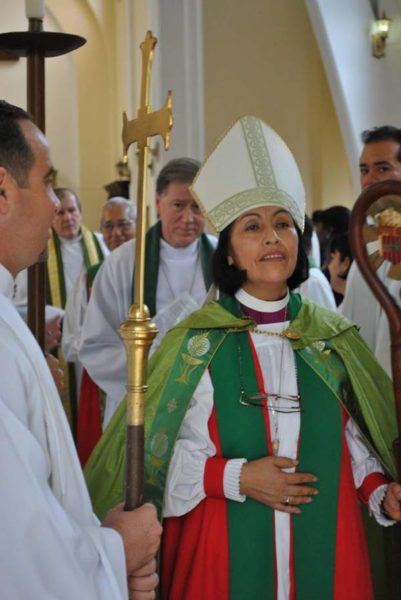New era of freedom and expansion for Cuban churchPosted Feb 22, 2012 |
|
[Anglican Journal] Most Canadians visiting Cuba in February are there for the sun, the sea and the mojitos. But early this month, Archbishop Fred Hiltz of the Anglican Church of Canada led a delegation with a different purpose: to observe the 103rd synod of the Episcopal Church of Cuba, led in Havana by Bolivian-born Bishop Griselda Delgado del Carpio, bishop since 2010.

Archbishop Fred Hiltz follows Cuba’s Bishop Griselda Delgado at a pre-synod service in Havana. Photo: Andrea Mann
The Episcopal Church of Cuba traces its origins to an early Anglican presence on the island in 1901. It consists of 46 parishes and about 10,000 members. Within the Anglican Communion, the Cuban church has the status of an extra-provincial diocese since it is not part of a larger province and has no primate. Its governance includes the Metropolitan Council, which exercises oversight in matters of faith and order.
Enter the primate of the Anglican Church of Canada, who co-chairs the council with the archbishop of the West Indies and the presiding bishop of the U.S.-based Episcopal Church.
The primate — accompanied by Michael Thompson, general secretary, Michael Pollesel, former general secretary, and Andrea Mann, global relations coordinator, partnerships — experienced firsthand a Cuban church poised to expand its mission and rebuild its crumbling infrastructure.
“We didn’t have a lot to do with synod,” said Hiltz at a Church House presentation. “But once in a while we were asked for our opinion.” Also present in low profile and respecting the new leadership was Bishop Miguel Tamayo Zaldivar, former interim bishop of Cuba and retiring bishop of Uruguay.
At a notable opening service, Delgado had the clergy renew their ordination vows. “It was a memorable moment for the church, for her and for them,” said the primate.
Later, in a lengthy address, the bishop spoke of walking together in physical and spiritual unity in Christ and moving ahead in new directions. She encouraged the clergy to work together in spite of their real theological and political differences.
At the synod’s workshops, the bishop laid the foundations for a different way of meeting and working. Lively debates arose around everything from nominations to seminary and faculty positions to smoking on church property.
After synod, the Canadian representatives took advantage of the Cuban people’s singular hospitality as they toured the eastern end of the island and its interior.
“The parish priests showed us the church buildings, and everywhere the people came out to greet us,” said Pollesel. “The church in Cuba is coming into a new era of freedom.”
Always in scarce supply, the Cuban Episcopal clergy works under tremendous disadvantages. “In one parish, the rectory got sold and the priest has to live several kilometers away in a Soviet-era apartment block,” said Thompson.
Mann described the “radical” hospitality and open-spirited love of the Cuban people, who have so little yet “from that scarcity show just an amazing generosity.” Everywhere they were met with copious cups of strong sweet coffee, safe, clean, dry accommodation, drivers and abundant meals featuring the local rice-and-bean-based cuisine. “It is a privilege to travel with people who live their faith,” Mann said.
Many church buildings are in a state of near-collapse. At the Church of St. John the Evangelist, for example, Fr. Albert had to hammer open a sheet of galvanized metal to permit entrance to his congregation, and later hammer it closed. At the Church of the Good Shepherd, a foundation capable of supporting three stories has been laid, but the congregation cannot afford a roof and fears damage to the structure during hurricane season. Yet essential work could be done very cheaply. “It’s amazing what $5,000 or $6,000 U.S. can do in Cuba,” said Hiltz.
Another problem is the scarcity of clergy, which forces parishes to rely on seminarians and lay ministers to lead prayer when no priest is available. “They would like to have four or five archdeacons but they can have only one,” said Hiltz. The lack of pensions for retiring clergy such as Tamayo is another pressing issue. The primate plans to work with the Metropolitan Council to explore ways of supporting the Cuban church financially. (The council has no funds of its own.)
— Diana Swift is staff writer of the Anglican Journal.

Social Menu